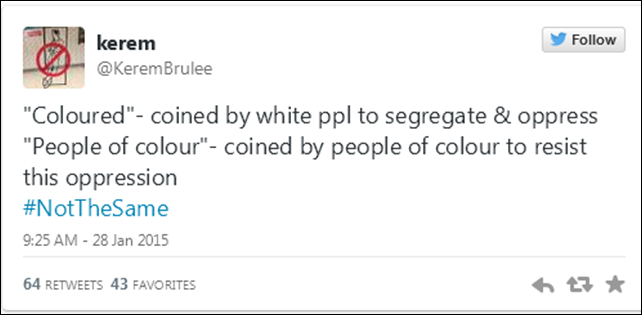Oh, how the mighty fall! Turns out that after years of being lauded as both an actor by the press and a heartthrob by his adoring fangirls, Benedict Cumberbatch finally let slip his fine-shined shoes, revealing the pus-packed warts of prejudice on his feet. I of course refer to his recent Stateside appearance on the Tavis Smiley show, where the Sherlock star gave the audience, and the world, a taste of the the white supremacy burning in his blackened heart, reviving a term of address long since confined to the cobwebs of history:
“I think as far as coloured actors go, it gets really different in the UK, and a lot of my friends have had more opportunities here [in the US] than in the UK, and that’s something that needs to change,” Cumberbatch said on PBS talk show Tavis Smiley.
“Something’s gone wrong, we’re not representative enough in our culture of different races and that really does need to step up a pace.”
What a flagrant display of bare-faced, hate-soaked bigotry on Cumberbatch’s part, harking back to the days of Antebellum slavery and Jim Crow, wanting to see blackfolk restricted to beasts of burden for the whims of the white man….
Oh, wait…that’s not it! Not even close.
Try telling that, however, to the Tavis-viewing Twitterati, many of whom signalled their epic umbrage via their social medium of choice; in their minds, Cumberbatch’s use of the term “coloured” triggered a whole host of associations unconnected with the full context of his words. It didn’t take long for the special interest machine on this side of the pond to pick up his racial faux-pas and run with it. Show Racism the Red Card, the UK’s leading anti-racism charity, appreciated the basic gist of the actor’s argument, yet saw fit to take him to task for his “[in]appropriate” and “outdated” turn of phrase.
As eyeroll-eliciting as their speech-policing proved, it paled in comparison to the fuss kicked up by certain media columnists. In the Independent’s online op-ed section, one Yemisi Adegoke made the rather histrionic claim that “calling black people ‘coloured’ removes part of their humanity”, associating the word’s use with the dark days of white supremacy:
The word “coloured” was used in the 1960s and 70s, as it was considered a polite way to address people of colour compared to alternatives. For some it serves as an uncomfortable reminder of a time when racism was commonplace.
In the US context, the word has even stronger negative connotations. It takes us back to a time of segregation where “coloureds” were allocated separate schools, drinking fountains and entrances under the premise of being “separate but equal.” While the races were separate they certainly weren’t equal. Facilities were of much lower quality for African Americans who were regarded as and treated like second-class citizens.
The word “coloured” is offensive because it removes an element of humanity from people. Ribena is coloured, walls are coloured, people may be of colour but they are not coloured. It also harks back to the racist notion that being white is the default state and everyone else is “other,” an aberration from the norm.
In so far as Adegoke singles out the use of “coloured(s)” as noun rather than adjective, I actually think she’s onto something; unwittingly or otherwise, semi-casual references to “(the) coloureds”, or, in more modern parlance, “(the) blacks”, have a certain alienating effect on my ears, overplaying the difference between the demographic and all others at the expense of the internal diversity amongst its members. I notice this choice of wording being employed by right-on, identitipolitik-endorsing progressives as well as old-fashioned racists, reactionaries, and those simply set in their ways. Surprisingly, one of the best critiques of this linguistic subsumption comes from none other than neoreactionary icon Nick Land; in his Dark Enlightenment magnum opus, he identifies a glaring (and grating) example of term discrepancy in John Derbyshire’s notorious Takimag article, ‘The Talk: Nonblack Version’:
Yet even to a reasonably sympathetic, or scrupulously obnoxious, reading, Derbyshire’s article provides grounds for criticism. For instance, and from the beginning, it is notable that the racial reciprocal of “nonblack Americans” is ‘black Americans’, not “American blacks” (the term Derbyshire selects). This reversal of word order, switching nouns and adjectives, quickly settles into a pattern. Does it matter that Derbyshire requests the extension of civility to any “individual black” (rather than to ‘black individuals’)? It certainly makes a difference. To say that someone is ‘black’ is to say something about them, but to say that someone is ‘a black’ is to say who they are. The effect is subtly, yet distinctly, menacing, and Derbyshire is too well-trained, algebraically, to be excused from noticing it. After all, ‘John Derbyshire is a white’ sounds equally off, as does any analogous formulation, submerging the individual in the genus, to be retrieved as a mere instance, or example.
That said, Cumberbatch’s unwitting foray into speechcrime hardly stoops to this “subtly, yet distinctly, menacing” level; whatever historical associations his adjectival use calls to mind, the context clearly negates any malicious or dubious intent, making the accusation of “removing [black peoples’] humanity” all the more baffling.
I also find the distinction between “coloured person” and “person of colour” to be little more than a semantic squabble; to quote another Independent Voice, that of Matthew Norman: “It all seems a bit People’s Front of Judea/ Judean People’s Front to me”. As such, I find it disappointing to read Bim Adewunmi (previously given honourable mention here for challenging Dianne Abbot’s racial granfaloonery) defend its significance with an “argument” that amounts to one big, fat genetic fallacy.
Note the difference, please. “Coloured” is not equivalent to “people of colour”.
A few people have piped up to ask what the difference between “coloured” and “people of colour” is. Here’s one Twitter user’s eloquent and succinct explanation:
Truly, this is not difficult to grasp.
Maybe Adewunmi and Brulee might wanna tell that to the NAACP: clearly, the National Association for the Advancement of Colored People failed to get the memo (which might explain their adherence to the adage that the only good “nigger” is a dead “nigger”).
All that aside, doesn’t the automatic equation of “coloured” with “black” signal a certain racial solipsism on the parts of Adegoke, Adewunmi, and the Tavis tweeters? Perhaps Cumberbatch used “coloured” as a catch-all for non-white actors (and actresses) in general, rather than any particular demographic thereof. Assuming the state of play resembles a chequerboard does something of a disservice to those not named for its tones. One could well make the argument that Cumberbatch exercised more racial sensitivity than his critics, not less.
Whichever of the two one might prefer, both “coloured person” and “person of colour” strike me as retardedly redundant terms to describe nonwhite folk, what with every fucker under the sun being some shade of something; with that in mind, it would hardly break my heart to see both terms fall into disuse with the passage of time. In the meantime, I see no need for the type of knee-jerk, context-ignorant speech-policing which only serves to degrade discourse on matters relevant to the people altmodischly addressed. To quote black British actor David Oyelowo: “To attack him for a term, as opposed to what he was actually saying, I think is very disingenuous and is indicative of the age we live in where people are looking for sound bites as opposed to substance.”
~MRDA~





Coloured is the new black.
Another ostensibly liberal, well-intentioned white guy steps into the muck. Not by pushing a terrible argument, but by simply not utilizing the correct jargon. Ugh, I pray this brouhaha(ha!) is simply an effect of social media, and not that political debate bas become this degraded.
Reminds me of that recent Girls episode where Dunham excoriates a fellow guy writer for not listing a woman among a brief list of great writers. Hey, I know squat about literature but I too could have jumped down their throats in uttering that particular criticism.
Two shades of grey.
This is exactly why I despise the ‘Kinder-Gentler-Pussier’ libertarians, who try to sugar-coat everything, talk about how capitalism will make life better for transexual negroes and bear-fuckers, and so forth. These cunts will say anything, because it doesn’t matter to them whether you’re an anarchist or a Nazi, to them it’s all heresy; or as the late Jonathan Bowden put it ‘a species of Satanism that you’re not to have anything to do with’.
The proper response when someone accuses you of racism is, ‘what of it, nigger?’ Just as it was necessary to mock and denigrade Christianity before its strangehold on Europe could be relaxed (and it’s still there, with the invisible garrot of leftist antinomianism) so it is necessary that people no longer pretend things like mass opinion and victimhood are important. There’s nothing I hate more than a libertarian that tries to prove how capitalism promotes ‘equality’ – that’s a lie, and a damned lie at that, and thank Tod Almighty nature and capital have no time for egalitarian fantasies.
Sure, if you’re aligned with the Church of Cantwell; his MO isn’t mine, however.
But it isn’t a lie to acknowledge that capitalism improves the quality of life for “transexual negroes and bear-fuckers, and so forth”, is it? None of that necessitates a belief in the chimera of “equality”, just as appealing to the self-interest of this or that cluster of persons isn’t necessarily pandering (until you ride roughshod over key principles to attain approval).
It might make sense if these people were, like, independent power centers, but their importance in society is entirely predicated on their alleged victimhood.
Part of the equality political cult/control lever is to emphasize an account of mass sentiment, and to ’empower’ it, usually Soviet style. That’s not quite the same thing as striking a deal with some peasants because you also hate the bandits. The promotion of self-interest as a unifying ideological agenda is what is behind mass politics; granted the scale of modern demographics can’t be ignored but neither is it meaningful to try to take account of what are essentially people posturing based on whomever they happen to feel the need to please to be accepted. This isn’t a reliable source of power, or much of a useful indicator; the more pressed the masses are the wilder their gyrations become.
By ‘these cunts’ I meant politically sensitive masses, such as the viewers of this show.
I really have no trouble when “people of colour” like blacks, East Asians, and others refer to themselves as “People of Colour.” If that is how they want to identify themselves, that is their decision. So I don’t think of Cumberbatch as being out of line at all.